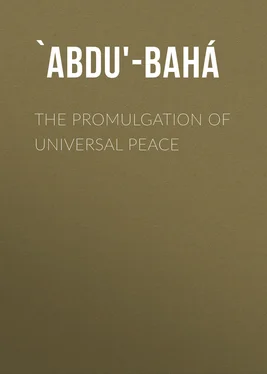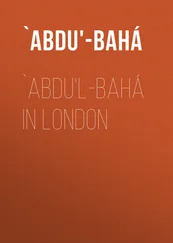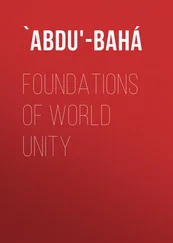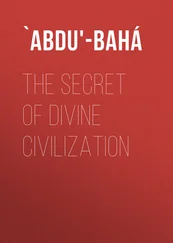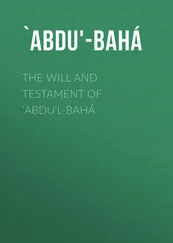`Abdu'-Bahá - The Promulgation of Universal Peace
Здесь есть возможность читать онлайн «`Abdu'-Bahá - The Promulgation of Universal Peace» — ознакомительный отрывок электронной книги совершенно бесплатно, а после прочтения отрывка купить полную версию. В некоторых случаях можно слушать аудио, скачать через торрент в формате fb2 и присутствует краткое содержание. Издательство: Иностранный паблик, Жанр: foreign_prose, foreign_religion, Философия, Ужасы и Мистика, foreign_psychology, на английском языке. Описание произведения, (предисловие) а так же отзывы посетителей доступны на портале библиотеки ЛибКат.
- Название:The Promulgation of Universal Peace
- Автор:
- Издательство:Иностранный паблик
- Жанр:
- Год:неизвестен
- ISBN:нет данных
- Рейтинг книги:4 / 5. Голосов: 1
-
Избранное:Добавить в избранное
- Отзывы:
-
Ваша оценка:
- 80
- 1
- 2
- 3
- 4
- 5
The Promulgation of Universal Peace: краткое содержание, описание и аннотация
Предлагаем к чтению аннотацию, описание, краткое содержание или предисловие (зависит от того, что написал сам автор книги «The Promulgation of Universal Peace»). Если вы не нашли необходимую информацию о книге — напишите в комментариях, мы постараемся отыскать её.
The Promulgation of Universal Peace — читать онлайн ознакомительный отрывок
Ниже представлен текст книги, разбитый по страницам. Система сохранения места последней прочитанной страницы, позволяет с удобством читать онлайн бесплатно книгу «The Promulgation of Universal Peace», без необходимости каждый раз заново искать на чём Вы остановились. Поставьте закладку, и сможете в любой момент перейти на страницу, на которой закончили чтение.
Интервал:
Закладка:
He became well-known in regard to these qualities before the Báb appeared. Then Bahá’u’lláh declared the Báb’s mission to be true and promulgated His teachings. The Báb announced that the greater Manifestation would take place after Him and called the Promised One “Him Whom God shall make manifest,” saying that nine years later the reality of His own mission would become apparent. In His writings He stated that in the ninth year this expected One would be known; in the ninth year they would attain to all glory and felicity; in the ninth year they would advance rapidly. Between Bahá’u’lláh and the Báb there was communication privately. The Báb wrote a letter containing three hundred and sixty derivatives of the root Bahá. The Báb was martyred in Tabríz; and Bahá’u’lláh, exiled into ‘Iráq in 1852, announced Himself in Ba ghdád. For the Persian government had decided that as long as He remained in Persia the peace of the country would be disturbed; therefore, He was exiled in the expectation that Persia would become quiet. His banishment, however, produced the opposite effect. New tumult arose, and the mention of His greatness and influence spread everywhere throughout the country. The proclamation of His manifestation and mission was made in Ba ghdád. He called His friends together there and spoke to them of God.
At one point He left the city and went alone into the mountains of Kurdistán, where He made His abode in caves and grottoes. A part of this time He lived in the city of Sulaymáníyyih. Two years passed during which neither His friends nor family knew just where He was.
Although Bahá’u’lláh was solitary, secluded and unknown in His retirement, the report spread throughout Kurdistán that this was a most remarkable and learned Personage, gifted with a wonderful power of attraction. In a short time Kurdistán was magnetized with His love. During this period Bahá’u’lláh lived in poverty. His garments were those of the poor and needy. His food was that of the indigent and lowly. An atmosphere of majesty haloed Him as the sun at midday. Everywhere He was greatly revered and beloved.
After two years He returned to Ba ghdád. Friends He had known in Sulaymáníyyih came to visit Him. They found Him in His accustomed environment of ease and affluence and were astonished at the appointments of One Who had lived in seclusion under such frugal conditions in Kurdistán.
The Persian government believed the banishment of the Blessed Perfection from Persia would be the extermination of His Cause in that country. These rulers now realized that it spread more rapidly. His prestige increased; His teachings became more widely circulated. The chiefs of Persia then used their influence to have Bahá’u’lláh exiled from Ba ghdád. He was summoned to Constantinople by the Turkish authorities. While in Constantinople He ignored every restriction, especially the hostility of ministers of state and clergy. The official representatives of Persia again brought their influence to bear upon the Turkish authorities and succeeded in having Bahá’u’lláh banished from Constantinople to Adrianople, the object being to keep Him as far away as possible from Persia and render His communication with that country more difficult. Nevertheless, the Cause still spread and strengthened.
Finally, they consulted together and said, “We have banished Bahá’u’lláh from place to place, but each time he is exiled his cause is more widely extended, his proclamation increases in power, and day by day his lamp is becoming brighter. This is due to the fact that we have exiled him to large cities and populous centers. Therefore, we will send him to a penal colony as a prisoner so that all may know he is the associate of murderers, robbers and criminals; in a short time he and his followers will perish.” The Sulṭán of Turkey then banished Him to the prison of Akká in Syria.
When Bahá’u’lláh arrived at Akká, through the power of God He was able to hoist His banner. His light at first had been a star; now it became a mighty sun, and the illumination of His Cause expanded from the East to the West. Inside prison walls He wrote Epistles to all the kings and rulers of nations, summoning them to arbitration and universal peace. Some of the kings received His words with disdain and contempt. One of these was the Sulṭán of the Ottoman kingdom. Napoleon III of France did not reply. A second Epistle was addressed to him. It stated, “I have written you an Epistle before this, summoning you to the Cause of God, but you are of the heedless. You have proclaimed that you were the defender of the oppressed; now it hath become evident that you are not. Nor are you kind to your own suffering and oppressed people. Your actions are contrary to your own interests, and your kingly pride must fall. Because of your arrogance God shortly will destroy your sovereignty. France will flee away from you, and you will be overwhelmed by a great conquest. There will be lamentation and mourning, women bemoaning the loss of their sons.” This arraignment of Napoleon III was published and spread.
Read it and consider: one prisoner, single and solitary, without assistant or defender, a foreigner and stranger imprisoned in the fortress of Akká, writing such letters to the Emperor of France and Sulṭán of Turkey. Reflect upon this: how Bahá’u’lláh upraised the standard of His Cause in prison. Refer to history. It is without parallel. No such thing has happened before that time nor since—a prisoner and an exile advancing His Cause and spreading His teachings broadcast so that eventually He became powerful enough to conquer the very king who banished Him.
His Cause spread more and more. The Blessed Perfection was a prisoner twenty-five years. During all this time He was subjected to the indignities and revilement of the people. He was persecuted, mocked and put in chains. In Persia His properties were pillaged and His possessions confiscated. First, there was banishment from Persia to Ba ghdád, then to Constantinople, then to Adrianople, finally from Rumelia to the prison fortress of Akká.
During His lifetime He was intensely active. His energy was unlimited. Scarcely one night was passed in restful sleep. He bore these ordeals, suffered these calamities and difficulties in order that a manifestation of selflessness and service might become apparent in the world of humanity; that the Most Great Peace should become a reality; that human souls might appear as the angels of heaven; that heavenly miracles would be wrought among men; that human faith should be strengthened and perfected; that the precious, priceless bestowal of God—the human mind—might be developed to its fullest capacity in the temple of the body; and that man might become the reflection and likeness of God, even as it hath been revealed in the Bible, “Let us make man in our image.”
Briefly, the Blessed Perfection bore all these ordeals and calamities in order that our hearts might become enkindled and radiant, our spirits be glorified, our faults become virtues, our ignorance be transformed into knowledge; in order that we might attain the real fruits of humanity and acquire heavenly graces; in order that, although pilgrims upon earth, we should travel the road of the heavenly Kingdom, and, although needy and poor, we might receive the treasures of eternal life. For this has He borne these difficulties and sorrows.
Trust all to God. The lights of God are resplendent. The blessed Epistles are spreading. The blessed teachings are promulgated throughout the East and West. Soon you will see that the heavenly Words have established the oneness of the world of humanity. The banner of the Most Great Peace has been unfurled, and the great community is appearing.
19 April 1912
Talk at Earl Hall
Интервал:
Закладка:
Похожие книги на «The Promulgation of Universal Peace»
Представляем Вашему вниманию похожие книги на «The Promulgation of Universal Peace» списком для выбора. Мы отобрали схожую по названию и смыслу литературу в надежде предоставить читателям больше вариантов отыскать новые, интересные, ещё непрочитанные произведения.
Обсуждение, отзывы о книге «The Promulgation of Universal Peace» и просто собственные мнения читателей. Оставьте ваши комментарии, напишите, что Вы думаете о произведении, его смысле или главных героях. Укажите что конкретно понравилось, а что нет, и почему Вы так считаете.
